#the death and life of marsha p johnson
Explore tagged Tumblr posts
Text
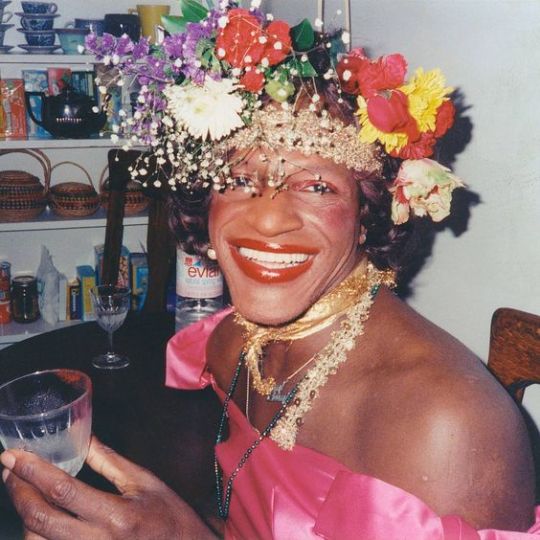
According to legend, Marsha P. Johnson was the one who threw the first shot glass at the Stonewall Riot. Marsha would later say that wasn't true, that she only showed up to the riot hours after it began. While the story may not be true, her impact on lgbt and especially transgender rights is that tremendous.
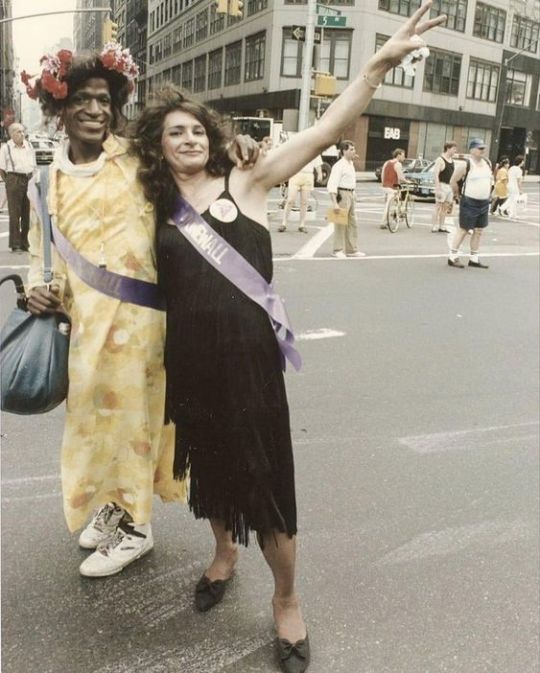
(Marsha P. Johnson and Sylvia Rivera)
After Stonewall, Marsha was a founding member of the Gay Liberation Front, and along with close friend and fellow activist Sylvia Rivera, they founded Street Transvestite Action Revolutionaries (S.T.A.R.) that advocated for the homeless trans people who were considered to be at the bottom of LGBT society.
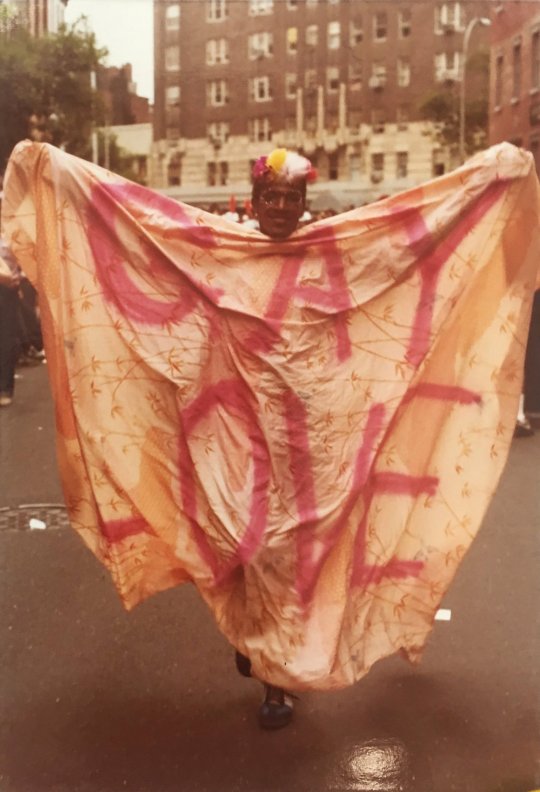
In 1974, when "drag queens" were banned from marching in a gay pride parade because of the "bad reputation," she, Rivera, and other trans people marched in front of the parade in protest. When asked why she was there, she told a reporter, "Darling, I want my gay rights now!"
When asked what the P in her name stood for, her answer was "pay it no mind," a philosophy that buoyed her through immensely dark places. She spent much of her life homeless and engaged in sex work to survive. She was arrested over 100 times, and had numerous stints in psychiatric institutions.
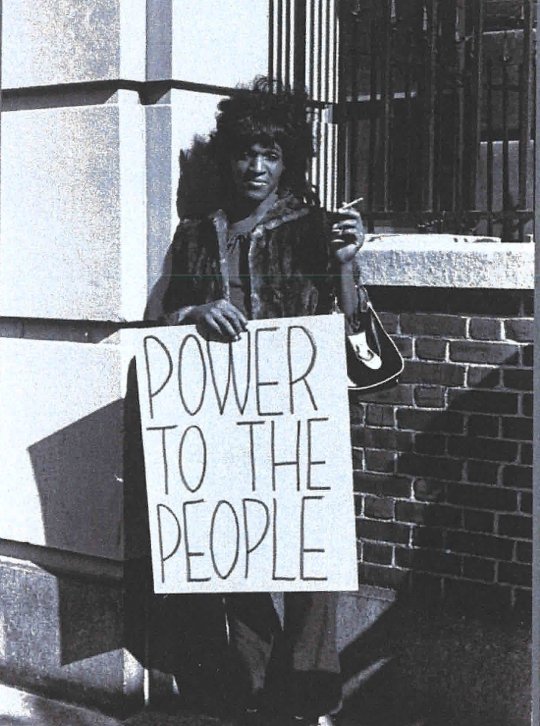
(Marsha P. Johnson in a demonstration outside Belleview Psychiatric Hospital)
On top of all her tireless activism, she was a celebrated drag performer with the troupe Hot Peaches.
youtube
In 2017 the documentary The Death and Life of Marsha P. Johnson came out and got mainstream distribution on Netflix. In 2018, The New York times honored Marsha with a much overdue obituary that recognized her for her work. In 2021, Youtuber NikkieTutorials honored Marsha with a look at the Met Gala, bringing in one of the best looks of the night (and one of the few to honor the "In America" theme in an interesting in creative way). In 2020, East River State Park in New York City was re-named Marsha P. Johnson State Park, and in 2023, a floral archway was installed.

I honestly had a really hard time writing about Marsha. I first learned about her when she was honored on an episode of RuPaul's Drag Race in 2012. Back then, there was little information about her available online, so coming to understand this icon Ru talked about so lovingly was difficult to do. Ever since then, it's been remarkable to see Marsha's name and renown grow.
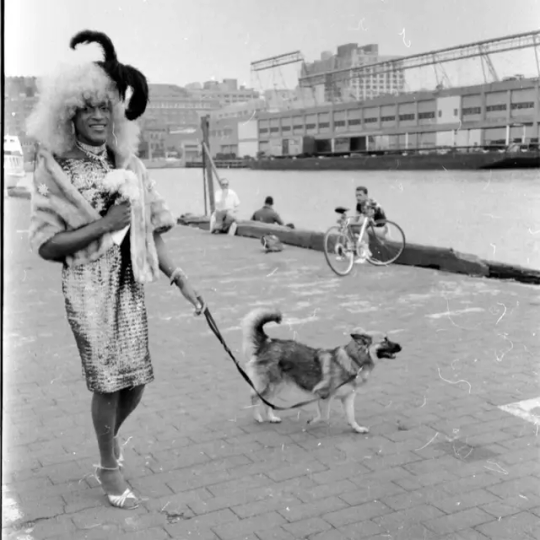
252 notes
·
View notes
Text
2024 Trans Ancestor Rite: Opening Divination
Hello hello, we are glad to be with you again this year, for what we are pretty sure is our eleventh year of ritually honoring the transgender dead in conjunction with the Trans Day of Remembrance. Welcome, new practitioners, and welcome back to those who have joined us before. Thank you for being here.
We are co-organizing our local trans community's TDOR observance (two separate events) this year, which has diverted some attention from setting up this blog and getting the word out online. However, we have consulted our ancestral helping spirits about participating in the ritual again this year, and want to share those results with you all.
Marsha P Johnson, Sylvia Rivera, and Leslie Feinberg have all consented again to participating as ancestral helping spirits in the ritual. They can be honored and called on as such. When we asked what offerings they would like this year, Sylvia again requested candy (we have been giving sesame candies), lube, and poppers on the altar. Comrade Feinberg requested "creativity in repair," which we took to mean mending bridges within our local trans community, which has been experiencing some internal strife. Marsha's only request was "joy."
Asked what changes they would like us to make in the ritual format, all said that the new format is working, and the only suggestion came from Comrade Feinberg who told us to add "banishing fear" to the altar. Interpret that as you will.
Sylvia struck a somber tone during our divination, indicating that "success [is] critical" this year. When we asked for clarification, she responded "near dark" and "future unknown." Dark times are coming, and holding one another with these sorts of rituals becomes ever more important.
We asked about adding additional helping spirits to the ritual, and Sylvia told us the timing was wrong - we should incorporate new ancestors during the joyful period of the year, rather than putting them to work right away. We will be looking to call on more ancestors next June in order to bring them in both to receive honor and to help tend the line, so more on that to come in the spring.
Our helping spirit Agdistis, whom your two mods work with as a transgender ancestor, will be involved in our own observance again this year, but not in the public event. We want to minimize their contact on folks who are not skilled spirit workers when emotions are already going to be running so high. We plan to incorporate an element into the altar at the two public events which can absorb pain, sadness, fear, and other difficult ambient emotions from the spaces, which we can then offer to Agdistis separately to help our community metabolize them effectively. If you work with Agdistis, let us know your plans for incorporating them this year.
As we suggested last November, please feel free to incorporate local important transgender and gender nonconforming figures who have served caretaking or leadership roles in life and consent after death to hold the ancestral line in your own ritual. Your mods are based in the greater New York City region and thus work with ancestors localized there - but there is no reason you need to restrict your ritual to working with ancestral helping spirits from far away. Do some divination to find out what well and bright transgender ancestors may be available to serve as helping spirits in the place you call home.
Thank you all for your diligence, for your attention, for your participation, for your solidarity, and for your hard work over these many years. Whether you are joining us for the first time or have been with us from the beginning, we thank you and look forward to working together to bring peace and light to our beloved recent dead. May their memories be a blessing.
Post in the #troe2024 tag and we'll share your altar photos on the blog. Comrade Feinberg signed off with the word "courage," which is what we will leave you with here.
-- Mod Alder
34 notes
·
View notes
Text
LGBTQ+ History Month! - Marsha P. Johnson


It's LGBTQ+ History Month! So lets celebrate by looking at some more historic figures who were part of the LGBTQ+ community! Starting off this month with Marsha P. Johnson! She was an icon, known for her activism in gay rights, particularly on the exclusion of black and trans folk as well as homelessness within the LGBTQ+ community.
But despite her unwavering kindness and the recognition she received for her work in social justice - a lot of which has come after her death - she experienced immense hardship, abuse, discrimination throughout her life and uncertainty surrounding her death. She deserved better. Trans people deserve better.
R.I.P. Marsha P. Johnson
To learn more and get involved, you can check out the Marsha P. Johnson Institute which is dedicated to supporting black, trans folk across the US
P.S. - I love doing these kinds of posts so if you have any more historic figures you'd like me to cover, please suggest in the comments
Image & text description in ALT
#education#everybodys invited#lgbtq history#lgbt history#lgbtq community#lgbtq#trans history#trans awareness#trans pride#marsha p johnson#lgbtq history month#lgbtqia#no lgb without the t#teaching#sex education#id in alt text#rshe#id included#queer history
55 notes
·
View notes
Text
I think the thing that well and truly bothers me the most is that for all that tumblr does to deify Marsha P. Johnson, we don't talk about the situation surrounding her death. This is one of the things that bothered me about the way the documentary spends time speculating about something like the mafia. It's great that the community came out in force when Marsha was killed and the NYPD wasn't bothering to investigate.
But for all of Marsha's importance she wasn't living a privileged life. The community came out for her death, but did the community ever really come out for her life is a question I find myself asking constantly. Would her death have been avoided if she was more stable? If the community was willing to give her the resources she needed to live comfortably? It's obviously impossible to say now, but I think about it a lot.
I still remember the recorded video of Sylvia Rivera being homeless and it makes me want to weep. The evidence doesn't really point to a heartwarming truth.
16 notes
·
View notes
Text
Celebrating Black Queer Icons:
Marsha "Pay It No Mind" Johnson
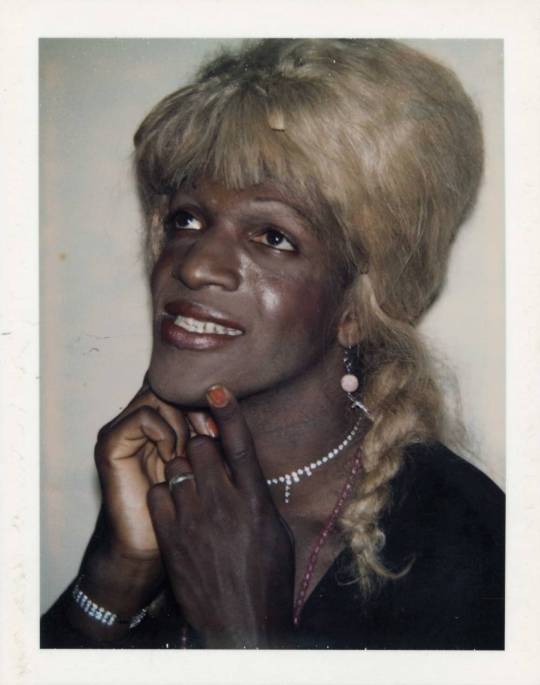

Johnson was born August 24, 1945. A drag queen and sex worker, after moving to New York City from Elizabeth, New Jersey, Johnson is probably best known for participation in Queer Liberation and AIDS activism from 1969 until her death in 1992. While often associated with transgender women, Johnson self identified as gay, a transvestite, and a queen and actively distinguished her identity from the contemporary transsexual community. As for Johnson's gender? Well, pay it no mind. Johnson's activism began in 1969 after being involved in the Stonewall Inn Riots. She is often attributed as being in the riot's vanguard, alongside Zazu Nova and Jackie Hormona. Johnson would later go on to deny this, and is quoted as saying she did not arrive until after the riots had already started. Johnson would later go on to join the Gay Liberation Front and co-found STAR (Street Transvestite Action Revolutionaries), with Silvia Rivera. STAR would open the STAR House in 1970, which acted as a home for gay and trans homeless youths. In 1973 Johnson and Rivera were both temporarily banned by a gay/lesbian committee, from participating in pride parades, because it was said queens were giving the movement "a bad name". This did not deter Johnson. Starting in 1980 Johnson began living with fellow activist, Randy Wicker, and his partner. Johnson, who was HIV positive, would later become Wicker's partner's caregiver as they became terminally ill due to AIDS. After visiting Wicker's partner in the hospital Johnson became dedicated to spending time with AIDS patients and engaged in street actions with groups like ACT UP. Johnson was a deeply religious person throughout her life. Primarily Catholic, Johnson was said to have a very direct and personal relationship with divinity. On July 6, 1992, Johnson's body was found in the Hudson River. Johnson was cremated and after a march down 7th Avenue her ashes were spread in the Hudson. While initially ruled a suicide by the NYPD, this is highly contested to this day, with good reason. In 2002 Johnson's death was reclassified as Undetermined, and efforts in 2012 and 2016 have seen moderate success in getting the case reopened and re-investigated.
In the wake of her death Marsha P Johnson has become a nigh universal icon in queer communities and seemed like a good starting point for Black History Month. Moving forward I hope to focus on people less known, at least in melanin deficient circles. In a perfect world this would be daily, but I sadly don't have the spoons for it. I will effort to post at least 2-3 of these each week and have a list sufficient enough to carry me through February, and a little beyond. I plan on doing Willmer Broadnax next and have a list going that should cover at least the month of February, and hopefully beyond. Corrections and suggestions are welcome and much desired.
#celebrating black queer icons#black history#black history month#black history is queer history#black history is american history#marsha p johnson#marsha pay it no mind johnson#gay liberation front#street transvestite action revolutionaries#STAR Home#stonewall
321 notes
·
View notes
Text
Marsha “Pay it no mind” Johnson
I’m halfway through her documentary on Netflix (“The Death and Life of Marsha P Johnson”) and the more I learn the more I want to learn. Her life is so fascinating and she’s so brave.
I’m an advocate for queer people NOT having to know every detail of our history. But also, if you haven’t, I truly suggested learning about some of these people. They DIED for us. When literally everyone was against them, nobody would even investigate their deaths, they marched.
It is SO new that queer people are being accepted. And i wish we had the only queer generation here but most of them died. And I wish they could see what became of their efforts.
And, so importantly, TRANS RIGHT MATTER! Watch all these trans people advocate for gay rights and look me in the fucking eyes and tell me you think THEY don’t deserve their fucking RIGHTS when they saved more young queer people than you’ll ever meet.
#lgbtgia+#lgbtq community#lgbt pride#trans pride#transgender#marsha p johnson#queer pride#queer#queer community#lgbtqia
16 notes
·
View notes
Text

Marsha P. Johnson (1945-1992) and other protestors at New York University, Sept 14 1970. Diana Davies. NYPL.
Marsha was involved in LGBTQ rights protests right up to the end of her life.
"In 1992, New York became gripped by a gay bashing epidemic with 1,300 reports, 18% of which was allegedly perpetrated by police. Marches were organized in response, and Johnson was one of the activists who marched in the streets, demanding justice. Only weeks later, Johnson would also be found dead, having sustained a severe head injury."
The authorities tried to claim that her death was a suicide however it was almost certainly murder.
"How many years does it take for people to see that we're all brothers and sisters and human beings in the human race? I mean how many years does it take for people to see that we're all in this rat race together." Marsha P Johnson

A black-and-white collage poster urging mobilization after Marsha P. Johnson's death. The collaged letters read, "Justice for Marsha now! Pack a piece in your purse - Be a sister of fear! Gays unite now
16 notes
·
View notes
Text
...And Justice for All - We Literally Live in a Society

CW: Transphobia, Death
...And Justice for All (1979) begins with a black, trans-coded character, named Ralph Agee, being escorted into a holding cell block at the local police station wherein she is subjected to all manners of humiliating and degrading practices. The cops force Ralph to strip naked right in front of a cheering crowd of inmates, who stand a few centimetres away from where she is, the jail bars being the only thing keeping them at bay. The entire scene is deliberately framed as horribly dehumanizing.


There might have been an intentional parallel between this character and Marsha P. Johnson of Stonewall Riots' fame but that is mere speculation. What matters here is that Ralph's basic human rights are being trampled for the evident amusement of her law-enforcing captors. The scene sets the tone for the rest of the film, which is about the American judicial institution and who truly benefits from it. Agee's story is one of the many narrative threads weaving this tapestry.


Another such story is that of a lower-class, young white man named Jeff McCullaugh who gets mistaken for a wanted criminal and rushed through a cruel system eager to condemn him, all at the hands of an uncaring judge - played by John Forsythe. Said judge happens to be charged with sexual assault.

There is a lawyer (played by Jeffery Tambor) who experiences a nervous breakdown for simply doing his job. In this instance, his job was to acquit a man accused of murder only for said murderer to go out and kill children.

All of these stories are tied together by Al Pacino's character, the protagonist, a defense attorney juggling all these cases and personal crises at the same time: Ralph and Jeff, the rapist judge (who blackmails him into court representation, by the way), and every other aspect of his life.

...And Justice for All paints an unflattering, unflappably verosimile picture of American "Justice" from the perspective of someone who tries (emphasis on "tries") to help those who cannot help themselves. Fighting the good fight but crashing on the wall of societal biases. People like Ralph and Jeff are left to rot, cast down into the hell of the prison system by the hands of bigoted, classist, racist judges upholding the sanctity of the law. Only for the very same system of laws to bend over backwards in order to shield them from accountability when they are the ones who commit the crime. It's an all too familiar hypocrisy of which this film is merely scratching the surface... but the blood is still dripping out of it.



The direction is solid and the acting is superb - unsurprisingly, given the cast. Al Pacino was knocking it out of the park in the 1970's with Francis Ford Coppola's The Godfather films, Sidney Lumet's Serpico and Dog Day Afternoon. The latter, in particular, is relevant. If I had a nickel for every time Pacino played a trans ally in the 1970's...

Let's go back to the opening scene from ...And Justice for All. Whilst Ralph was being degraded in front of an eager audience. Pacino's character was lying on the floor inside one of the cells. He observed the scene in stunned silence as a homeless man was peeing himself beside him. This is how the protagonist is introduced, by witnessing a gross violation of human rights and getting urinated on for the trouble. In an instant, you may understand his character, his motivations and his entire journey throughout the diegesis. The journey of a man trying to do good in a world that will quite literally piss on everything for which he stands, while he fails to help others. Pacino has a penchant for playing the down-on-his-luck, well-meaning everyman constantly on the edge of spiraling and this role is no exception. Truthfully, everyone in the cast brings their A-game regardless of how much screen time they may have been given.

Robert Christian, in particular, brings forth a dimension of genuine frailty and humanity to Ralph Agee, a character that, in a lesser script, would have been reduced to a one-note joke. Her collective scenes are less the 20 minutes in total but she leaves a damn strong impression! The many times someone in a position of power makes her remove her wig are some of the most understatedly potent scenes in the entire picture. The casual cruelty on display is heartbreaking to watch. Christian's performance is what saves this role from being mere thematic fodder.

At the end of the day, this is what ...And Justice for All is actually about: humanity. Pontificating over the inherent unfairness of American institutions would have rung utterly hollow had the film forgotten to actually focus on the humans who are affected by all this, in depth. Without showcasing the horrid treatment reserved to the likes of Ralph and Jeff as well as who they were as people, their wants and needs, ...And Justice for All would have failed both its statement thesis and at forming a connection with the audience, because there would be no reason to care.

It sounds so painfully obvious when I type it all out like this but the sentiment speaks to the urgency by which I utter these words: there is no Art without Humanity, and there is no Art that can confront social issues without understanding people. Everything is interconnected, our experiences and the representation of said experiences as we exist under any form of governing bodies. We literally live in a society. And it's a society, the one we live in, that has been divided in castes and classes, by race, religion, sexuality and how much money one has in their bank accounts. It's a society that cares not for the fate of those who have been forced to reside at the very bottom...
I have more to say about Ralph's actor.

Robert Christian was an award-winning theatre thespian from New York. He's had several roles both in films and TV, one such role was that of Bob Morgan in the soap opera, Another World. That would end up being his final role.

Christian died of AIDS-related pneumonia in 1983. He was one of the earliest victims of the disease. He was 43. Robert Christian was a queer, black man who died of AIDS in the 1980's.
There are many thoughts, feelings floating in my head as I write this: anger, sadness, frustration, powerlessness. There are many, many things I could be adding right now to bring this entire essay to a full circle but, realistically, what is even left for me to say?! What I will tell you, instead, is to go watch ...And Justice for All. It's not perfect and some aspects of it may have inevitably aged poorly, but it's real! It's a "prestige" Hollywood outing from 45 years ago with real queer representation and a real queer actor. It's not made up like freaking Goncharov! Do not let the memories of Robert Christian and Ralph Agee fade into obscurity like so many before and after it. That's it. That's all I have to say.
---
Sources: elisaroll.com/queerspaces and IMDB.
Follow Madhog on:
YouTube
Twitter
Bluesky
Blogger
Also, here’s a helpful website: https://arab.org/
#madhog thy master#...and justice for all#al pacino#robert christian#ralph agee#pride#trans#queer#marsha p. johnson#stonewall#john forsythe#american justice system#prison system#transphobia#aids#aids crisis#1979#film#review#analysis#lgbt+#we live in a society#dog day afternoon#the godfather#serpico#sidney lumet#francis ford coppola#queer history#queer spaces#essay
3 notes
·
View notes
Text
The Irony of Acceptance
- A journal entry from July 9, 2022
It has been 9 days since Pride Month has passed. As the pride logos from corporate companies start to fade, I am proud to say that my pride in who I am has not began to fade. That is because pride is 365 days a year, 7 days a week, and 24 hours a day.
Pride was made to celebrate our past, and those that came before us. It was created to honor those who have fought for gay rights. It takes courage to come to terms with one’s self identity. It is important that we rise up and celebrate. Not necessarily just for ourselves, but for the people the came before us. For the 36.3 million people who have died from the AIDS epidemic. For the people who fought during the Stonewall riots of 1969, especially Marsha P. Johnson.
As a black trans woman, Marsha was a pioneer for gay liberation, and she deserved a better life. Marsha died at the age of 46, and the police ruled her death as a suicide. However, no one knows the real cause of her death, but the police did not care to find out. She was found dead in a river, however, her legacy lives on.
Throughout Pride Month, I pondered about the idea of acceptance. As a young child, I feared the idea of everybody knowing my sexual orientation. What would others think of me, and would I be able to live my life comfortably or would I always live in the dark. Living in the shadows was not an option for me. For that reason, I came out on June 7, 2021.
To anybody who may be reading this, whether you are in the closet or not, I advise you to stop looking for acceptance from external sources. Spend your time doing things that will help you find yourself rather then exhausting your efforts to look for an impossible feeling of acceptance. In no circumstance, will anybody ever find themselves in a situation where they adored and accepted by all. Your life is not for someone to accept, rather focus on understanding yourself and your own environment.
The irony of acceptance and even tolerance is that it is degrading. By looking for acceptance, you put others on pedestals as if they have an authority over your life and how you should live it. As human beings, we were all created equal, thus, placing yourself in a search for acceptance is contradictory to our human nature.
Lastly, I leave you with some final thoughts. Let us live our lives with pride. Be proud of who you are, and all of your triumphs and tribulations. Successes and failures make us who we are. Stop looking for acceptance.

4 notes
·
View notes
Text
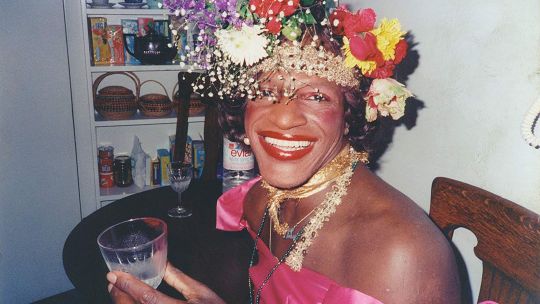
Hello everyone!!!
Wow… it’s been a hot minute since I made a post.Today I just wanted to talk about a new movie that I saw on Netflix the other day. The Life and Death of Marsha P Johnson. I thought it was great and wanted to share it with more people.
If you don’t know who she is then let me give you some backstory, Marsha P Johnson. According to the article “Remembering Marsha P. Johnson” by The Peak, a student newspaper for the Simon Fraser University, she was a gay and trans rights activist, most notably remembered for her involvement in the Stonewall riots of 1969. She along with another trans woman Sylvia Rivera headed trans rights activism despite their many struggles. Together they created the Street Transvestite Action Revolutionaries (STAR) to help homeless trans youth. Though it is important to remember, Marsha was a Black trans woman and that put a major target on her back. The article On Marsha P. Johnson’s Birthday, Remembering her True Legacy highlights her black identity and how even today it is Black trans youth that face more violence than any other trans youth.
But Marsha should not be remembered for her struggles, her work is amazing! Most articles and news sources, except the transphobic and homophobic ones, remember her as an icon. In fact, the article by The Peak even highlights the time she and Rivera marched in front of the 1973 pride parade after being banned from marching in it. THAT is icon behavior.
The main focus of this documentary was not Johnson’s work, it was her death. In 1992 she was found dead in the Hudson River and police ruled in a suicide without any further investigation. This is in spite of the fact that many of her friends thought it was foul play and reported seeing an injury on the back of her head. The documentary follows Victoria Cruz as she tries to uncover the real reason behind her friend Marsha’s death.
Though very little is discovered, this film is bringing up old conversations. The article Stonewall uprising: 50 years later—Emerging challenges for LGBTQ communities around the world brings up how trans identities are not researched as well as other queer identities. Marsha P. Johnson and Sylvia Rivera started the conversation and it is up to us to continue it. One point the paper brings up is “In contrast, a more strongly developed gender identity was related to greater gender identity discrimination and less inclusion in the community.” (Arcidiacono and Carbone 641). This just further emphasizes how trans identities are excluded. Though, Johnson’s and Rivera’s STAR house is a testament of how community is the most integral part of living your true self. This is something highlighted in The Afterward: Sylvia Rivera and Marsha P. Johnson in the Medieval Imaginary by Joy Ellison and Nicholas Hoffman who wrote about the accomplishments of the two women.
Overall, the movie provides a good entry point to learning about the life of Marsha P. Johnson. While it does focus on the investigation of her death, there are flashbacks to her work and involvement in activism. It is a reminder that even though her life was cut short, she helped millions of people around
References
Arcidiacono, & Carbone, A. (2021). Stonewall uprising: 50 years later—Emerging challenges for LGBTQ communities around the world. Journal of Community & Applied Social Psychology, 31(6), 639–643. https://doi.org/10.1002/casp.2584
Baska, M., & Fink, L. (2022, August 24). On Marsha P Johnson's birthday, remember her true legacy of Black trans joy in resistance. PinkNews. Retrieved April 22, 2023, from https://www.thepinknews.com/2022/08/24/marsha-p-johnson-activism-birthday-institute/
Ellison, & Hoffman, N. (2019). The Afterward: Sylvia Rivera and Marsha P. Johnson in the Medieval Imaginary. Medieval Feminist Forum, 55(1), 267–294. https://doi.org/10.17077/1536-8742.2140
Icart, C., & Young, W. (2022, November 15). Remembering Marsha P. Johnson. The Peak. Retrieved April 22, 2023, from https://the-peak.ca/2022/11/remembering-marsha-p-johnson/
8 notes
·
View notes
Text
Marsha P. Johnson (1945-1992)
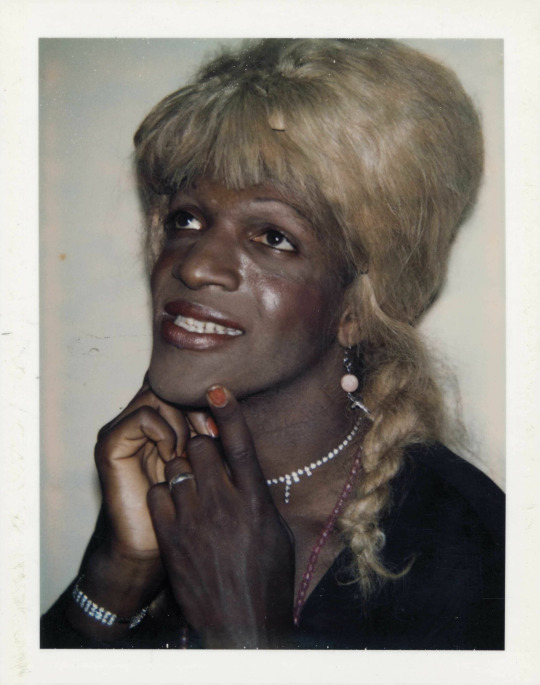
“As long as gay people don’t have their rights all across America, there’s no reason for celebration” -Marsha P. Johnson
(Content Warning: Transphobia, homophobia, hate crime, assault, illness and death.)
Marsha “Pay it no Mind” Johnson was a Black-American LGBT activist and a well-known participant of the Stonewall Inn uprising. She self-identified as a transvestite, gay person, and drag queen. Although Marsha never used the term “transgender” to describe herself (as the word was not popularized till after her death), she is recognized as playing an essential part in transgender liberation with her gender-non-confirming presentation and advocacy for including marginalized people — such as trans people, people of color, incarcerated people, homeless people, and people living with HIV/AIDS — in the LGBT movement.
Marsha was born the fifth of seven siblings in Elizabeth, New Jersey on August 24, 1945. She grew up in a working-class, African American household that held Christian religious beliefs; Marsha herself was a practicing Christian from life til death. She continued to maintain her relationship with her family even after moving away. She graduated in 1963 from Thomas A. Edison High School and then enrolled in the United States Navy.
Since the age of five, Marsha enjoyed dressing in feminine clothing but felt pressured to stop doing so because of the stigma surrounding cross-dressing. Marsha was even bullied and harassed by other children because of it. It wasn’t until she moved to Greenwich Village, New York that Marsha returned to dressing feminine and took on the name Marsha P. Johnson. She provided service to the LGBT community as a drag mother who assisted homeless LGBT youth.
As a queer person, Marsha had a hard time finding employment due to the persecution of gay people’s existence and limited rights to the LGBT community. Therefore, she had to turn to sex work for money. This was dangerous as full service sex workers like Marsha were often faced with violence by clients or arrested by police. She also worked as a drag performer with the group “Hot Peaches” and stated "I was no one, nobody, from Nowheresville until I became a drag queen.”
A turn of events came into Marsha’s life when the Stonewall Inn riots happened on June 28, 1969. Police would often raid gay bars since same-sex relations were illegal and shut down places that served alcohol to LGBT people. As usual, police began raiding the Stonewall Inn bar on Christopher street but this time would be different. Filled with anger, when the residents of the neighborhood saw an officer hit one of the lesbians and manhandled her into the police car, they began fighting back by throwing objects at the officers. Soon, a whole riot started between the protesters and police where the officers barricaded themselves inside while the protesters threw fire at them. Marsha, alongside Sylvia Rivera (another trans person and activist), arrived at 2am to this site and fought back on the front lines. Many stories have been told surrounding Marsha’s role during this riot but what we do known is that she played an important one.
After these events, a fight for gay liberation rose. The first ever Pride Parade was held in 1970 with support from gay right organizations such as the Gay Liberation Front. With that, both Marsha P. Johnson and Sylvia Rivera founded Street Transvestite (now Transgender) Action Revolutionaries (or STAR). This organizations was made to house homeless transgender youth. The purpose was to create a safe space for transgender individuals as many of them had been shunned by their families. This was very personal to Marsha since she herself had experienced homelessness. One thing that concerned Marsha was the exclusion transgender and LGBT people of color faced from the gay liberation movement. This was a step towards including minoritized individuals into the community. Sadly, the group was eventually evicted from their house which went from the back of an abandoned truck to a rundown building.
Marsha soon became a popular activist for the gay rights movement. People like Andy Warhol — an American pop artist — caught her attention and created art of her in a series entitled “Ladies and Gentlemen.” In 1972, she was interviewed to discuss gay rights where she advocated for gay people who were incarcerated. In 1980, she was even invited to be on the lead car of the Gay Pride Parade. In spite of this, Marsha experienced physical and mental health issues. As a sex worker, she was diagnosed with HIV in 1990 but didn’t hide it. Instead, she used her voice to speak up about the ideas surrounding AIDS and encouraged people to not be afraid of those living with HIV/AIDS. Marsha also struggled with mental health breakdowns throughout the 1970s and spent some time in psychiatric hospitals. This still didn’t stop her from continuing her activism for the LGBT community.
Marsha died on July 6, 1992 as her body was found in the Hudson River. Her death was ruled as a suicide, however, many people were suspicious as Marsha was not suicidal and believed it to be a hate crime. It was then ruled as a drowning. Many people in the LGBT community were angry as the police wouldn’t further investigate her death. It wasn’t until 25 years later that Victoria Cruz — a Puerto Rican-American LGBT activist and former domestic violence counselor — re-opened the case. Hundreds of people showed up for Marsha’s funeral as they crowded streets.
Marsha is now seen as a symbol for transgender liberation and is honored as a monument in Christopher Park. Today, we remember Marsha as a trailblazer for for LGBT rights.
Rest in Power Marsha.
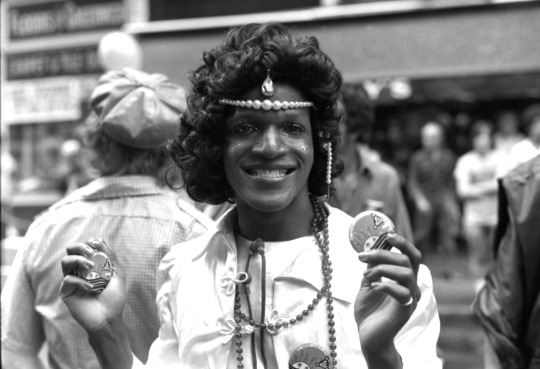
“History isn't something you look back at and say it was inevitable. It happens because people make decisions that are sometimes very impulsive and of the moment, but those moments are cumulative realities” -Marsha P. Johnson
10 notes
·
View notes
Text


I met the author of this book, Ian Eagleton, at a children’s book festival I was working at last weekend. He was so lovely, and I thought his book looked good, so I bought it, got him to sign it, and have just finished reading it.
Glitter Boy is an excellent middle grade novel which follows an eleven year old boy called James who loves singing and dancing and Mariah Carey. He also adores his lovely grandmother, but has been having a hard time with his mother, who walked out on them, and his dad, who’s not so sure about having a son who’s this fabulous. And, unfortunately, that sentiment is shared by some of the boys at school.
Poor James goes through the wringer, he really does - homophobia and his parents’ divorce and fighting with friends and the death of a loved one, Eagleton does not give this kid an easy time. But he also gives James a brilliant best friend, and some great gay mentors, and a really sweet when-they’re-both-a-bit-older love interest (because spoilers, while there’s clearly a mutual crush, they don’t get together, they’re still only eleven). And he also gives James a happy ending. I might have teared up a little.
The book also has a whole lot of stuff in it about LGBT history and the rights movement, and the celebration of specific figures - Marsha P. Johnson in particular is the focus of a whole subplot. You can tell the author is also an activist himself, and has a background in teaching.
If you like reading kids’ books, or you have a kid in your life who’s in that middle grade 9-13 age range, I really recommend this!
#books#rec#glitter boy#ian eagelton#if i’d had this and ‘a kind of spark’ as a kid i would have written so much fan fiction about addie and james somehow becoming friends lmao#so many great kids books in recent years! i’m so envious of the generation that gets to grow up on them!
3 notes
·
View notes
Link
#bisexual#natashalyonne#comedy#documentary#Horror#lesbian#lgbtq#lgbtqia#movie#pansexual#pride#pride2023#pridemonth#pridemonth2023#queer#queercinema#rockyhorrorpictureshow#trailer#trans
2 notes
·
View notes
Text
Never forget that Pride STARTED with the trans community, and was led largely by Black trans women. Marsha did a lot of work advocating for the homeless and vulnerable through the Street Transvestite Action Revolutionaries (STAR), which she co-founded with Sylvia Rivera, another trans woman of color. Both were founding members of the Gay Liberation Front and Gay Activists Alliance. Beloved by her community, she was lovingly known as St. Marsha by many. She would say that the P in her name stood for “Pay It No Mind”, the response she would give when asked about her gender or clothes. A hallmark of hers was her often elaborate flower crowns, which she would make herself, and her colorful clothing, bought from thrift shops or found discarded. She was frequently (and incorrectly) credited with throwing the first brick at Stonewall, but it is most likely that the true instigator was a Black lesbian woman named Stormé DeLarverie. Marsha was diagnosed with HIV in 1990 and was always outspoken about the disease and its stigma until her death in 1992, which was ruled a suicide. The decision sparked outrage and the queer community demanded an investigation, but crimes against queer people, especially queer people of color, were increasingly common at the time. In 2012, her case was reopened. Her cause of death is still undetermined.
Sources:
do not forget the patron saint of these weeks that we celebrate ourselves proudly and openly in the streets

her name was Marsha P Johnson, and we have her to thank for so much.
remember, the first Pride was a riot, and she was one of the brave souls who endured it to help carve the path which so many of us walk today. she helped found several activist groups regarding LGBT safety and wellbeing. and she was absolutely radiant, too.
thank you, Marsha. we remember you.
159K notes
·
View notes
Text
Transgender People In History/Today! Check out https://legacyprojectchicago.org/
The Roman emperor who ruled from 218 to 222, Elagabalus was born male but adopted feminine dress and requested genital removal surgery. However, she was shunned and assassinated at age 18. = Elagabalus was supposedly married as many as five times, also lavishing favors on male lovers. She aroused further discontent when she married the Vestal Virgin Aquilia Severa, a flagrant breach of Roman law and tradition. Her behavior estranged the Praetorian Guard, who supported her overthrow and subsequent murder.
A Black trans pioneer who was one of the first transgender women in the United States. In the 1940s, she was the first trans person to be put on trial for her identity. - Lucy Hicks Anderson. = Both Lucy Hicks Anderson and her husband were tried by the federal government. During her perjury trial Lucy Hicks Anderson insisted that a person could appear to be of one sex but actually belong to the other, saying, “I defy any doctor in the world to prove that I am not a woman.” She told reporters, “I have lived, dressed, acted just what I am, a woman.” She was placed on ten years probation as an alternative to prison. However, her troubles were not over. When the government concluded that Lucy had been illegally receiving Anderson’s allotment checks as the wife of a member of the U.S. Army, the couple was tried and convicted of fraud. – Died of natural causes in 1954 at age, 68.
A Black transgender woman and LGBTQ rights activist who helped homeless and struggling LGBTQ youth. - Marsha P. Johnson = Raids likes the one on the Stonewall Inn were not uncommon. This time, however, the patrons fought back. A shot glass was thrown into a mirror by Marsha P. Johnson who yelled ``I got my civil rights!'' That moment became known as ``the Shot Glass that was Heard Around the World.'' - In 1990, Marsha contracted AIDS. She spoke publicly about it and told people she hoped they would not be afraid of those who had the disease. On July 6, 1992, Marsha's body was found floating in the Hudson River. The police officers ruled her death a suicide.
A Scottish doctor who began taking hormones as a teen and had his birth certificate changed to male. - Ewan Forbes = Forbes led a troupe of Scottish country dancers, dressing and dancing the male part. In 1944, he graduated with medical degree from the University of Aberdeen. - 1965 when his brother died and Ewan stood to inherit the baronetcy and a large estate. A cousin challenged the inheritance, arguing that the re-registration of gender was invalid and Ewan was still legally a female, and thus was unable to inherit. The Scottish Court of Session ruled in Ewan’s favor, and in 1968 the Home Secretary confirmed the decision, granting him the title. Unfortunately, the case was conducted in secrecy, and was unable to be quoted in other judgments on the legal recognition of gender variance (though that has changed since his passing). With the case settled, the baronet returned to the life of a rural landowner. He was appointed a Justice of the Peace for Aberdeenshire in 1969 and in 1984 published The aul�� Days, a book of early reminiscences, including tales of gender displacement. He died on September 12, 1991 at age 79.
She starred in the American reality TV show called “I am Jazz” which documented her day-to-day experiences of being a transgender teenager. She also co-authored a children's book titled “I Am Jazz,” which gives a glimpse into her experience growing up questioning her gender identity. – Jazz Jennings = Jennings founded the TransKids Purple Rainbow Foundation. It aims to spread “the message of tolerance, acceptance and unconditional love which are a birthright for all trans kids.” - “So many transgender people in the community are being covered with this umbrella of misconception that we are going to hurt someone. But we are not trying to hurt anyone.”
Laverne Cox is an actress, Emmy-winning documentary film producer, and equal rights advocate. Cox is best known for her role as Sophia Burset in the Netflix series Orange Is the New Black. Cox was the first transgender performer nominated for an Emmy in an acting category. = “My name is Laverne Cox and I’m from Mobile, Alabama. Until recently, I have had a tremendous amount of shame about the bullying I experienced as a child. Whenever something would happen and my mother would find out, she would yell at me and say well why didn’t you fight back. Why aren’t you fighting back. And she would also say, what are you doing to make them treat you like that. So, I felt like it was my fault. We took the bus to school every day. I have a twin brother. They, the kids couldn’t beat us up on the bus because the bus driver was sort of watching in the rear-view mirror. But we knew that as soon as we got off the bus, we had to take off running or we’d get beaten up. And for years, I joked that I was a very fast runner as a child. And it was sort of my way of deflecting from how painful it was, to sort of feel like I was always in danger. Up until that point, everyone was telling me that I was a boy. I was 8 years old and I was just convinced that I was a girl. The therapist told my mom and she yelled at me that boys are this way and girls are this way. And it was just this big thing. And, I again, internalized a lot of shame about the way I was thinking about myself and about who I was. I loved to dance as a kid. I was always dancing around. I would dance in the supermarket. I would just dance everywhere. Back when PE was in schools, when the kids were doing free play, I was off dancing to music that was always in my head. And I always sort of had characters that I was playing and making up. So, I begged from 5 years old to 8 years old to be in dance classes and my mom finally found a program for me. And I believe that that saved my life. I did try to commit suicide once, when I was about 11 years old, unsuccessfully. But if I didn’t have school, my mom’s a teacher, and education and reading and something I loved and that I was good at, I don’t think I would have survived. I didn’t feel safe at all as a kid.
And I’ve had moments like that as an adult, but the difference with me as an adult is that I have support now. I have people in my life who support and validate me as who I am. As a kid, when kids were saying all these awful things about me, I thought that was the truth of who I was. And as an adult now, I find myself wanting to go back into oh people are saying this about me it must be true. But then I’m like, well no. I have people around me who are supportive and who are amazing who love me and are like no, what these people are saying about you is not who you are. And I know that that’s not who I am.
This past Christmas, my mom and I were, we were just talking and we hadn’t talked about the bullying stuff but you know, she, my mom she’s very aware of what’s been going on in the news with all the bullying stories. And she, it just sort of came up and she just said, just out of nowhere she said, “I’m sorry, I didn’t know how to… I didn’t know what to do. I’m sorry I didn’t know how to deal with it.” She had her way and she thought that was the way and it didn’t work. And she loves me, and she supports me, and she’s proud of me. And that’s all I really wanted as a kid to have my mom be proud of me. That’s all I wanted. And she is, so that’s kind of amazing.”
The Wachowskis: The Wachowskis are trans women who wrote and directed The Matrix (1999), Cloud Atlas (2012), and Bound (1996). They won the Saturn Award for Best Director for The Matrix. The Wachowskis have said that the original Matrix was written as a trans allegory. = Lana – “For years, I couldn't even say the words 'transgendered' or 'transsexual' - "When I began to admit it to myself, I knew I would eventually have to tell my parents and my brother and my sisters.” - "This fact would inject such terror into me that I would not sleep for days. I developed a plan that I worked out with my therapist. It was going to take three years. Maybe five." Lilly came out publicly as trans in 2016 after a reporter from the Daily Mail turned up at her door. “I just wanted - needed some time to get my head right, to feel comfortable. But apparently, I don't get to decide this," she said in a statement to the Windy City Times afterwards. "I am one of the lucky ones. Having the support of my family and the means to afford doctors and therapists has given me the chance to actually survive this process.” - "Transgender people without support, means and privilege do not have this luxury. And many do not survive." – “The Matrix trilogy - and particularly the first film, which won four Academy Awards - appear in plenty of lists about the "greatest science fiction films of all-time".
1 note
·
View note
Text
Fighting
With this election, in 2024, I’ve learned that life won’t always go your way, even if the outcome is dire and the world seems like it is targeting you directly. It is time to fight, as people have been saying for years. We have not been listened to; we must make the changes ourselves.
We have to fight for the respect that they give to everyone else, clawing our way out of the pits of depression. Respect has to be earned, but for us, it has to be fought for, so I will fight. With my mind, with my words, I will fight to be human. With my voice, with my hands. We cannot stop fighting because otherwise, we will sink into the quicksand of our own misfortune.
They think that just because they don’t massacre us, that means we are equal. Within the past 60 years, we’ve made incredible progress, and we can’t stop. We’ve been shown that the world will regress if given the chance, and we can’t let that happen. We need to make our voices be heard, not by any means necessary, but by any way they will listen.
If we die fighting, let our bodies be of protest, if our mouths are covered, let the gags be our voice, if we are blindfolded, let the silk they have bound us tell our story. Countless people have died for us to fight for the moral belief that we have existed and will continue to exist. It shouldn’t be a moral issue. Marsha P. Johnson, and Silvia Rivera, these people won’t be forgotten, they did so much for us. Activists have been giving us reasons to fight for decades and now we have to, everyone has to.
Why did they do anything at all? When the person at the top is so insane, he spouts fibs and factoids like a graceless gossip. He lies and gives us information millions of people would blindly follow, but not us, how can’t they see? The people, we, are anguished, fear has overtaken many of our lives, how can we survive this? People are fearing for their lives, maybe we aren’t completely doomed, but that doesn’t mean it’s not cause for panic. We are stronger than we think, we should be fighting, we should be telling people to use the tools they have available to spread a good message, not to do nothing.
People are suffering but people don’t care to understand us fully. I understand now what King meant when he said “Shallow understanding from people of good will is more frustrating than absolute misunderstanding from people of ill will.” People pretend to listen and then, when it counts, they put their trust in someone who wants us dead. How can we call those people our brothers, sisters, and even parents, when they won’t listen to the agony in our screams. How can we call those people our friends?
I could not even imagine what might happen if we don’t fight if we don’t shout and flood the streets until they are forced to pay attention. Perhaps the only way they will understand is if we are killed in the streets, but then, who will tell them that they are wrong. Will our death give us peace, at least? Some of the people in office border on clinically insane. How can they be expected to change anything if we sit idly and patiently. Then, the dead are more useful than the people who still have a voice but don’t use it.
The dead are at peace, they have done their work and now may rest, but we cannot rest yet. If we are targeted, if we are oppressed, then we have to live. Our very beings are that of protest. We can use ourselves to build each other up, to shout from the tallest tower, our own lives.
This is our incredibly unfortunate reality, that we may bleed out and be the greatest symbol of our protest, that we may drop dead and be louder than we could in our life. Why are we waiting when we could use our voice now and rest then?
I am an advocate of peace, of civil disobedience. I want no violence, not even against the people who are oppressing us. We need to nonviolently show people that we are human and that we care for our cause so that we can make changes. We need to stand up and speak up. Show people we are not afraid to yell from the tallest skyscraper that we are who we are, and break the rules that are unjust, as the people before us did.
0 notes